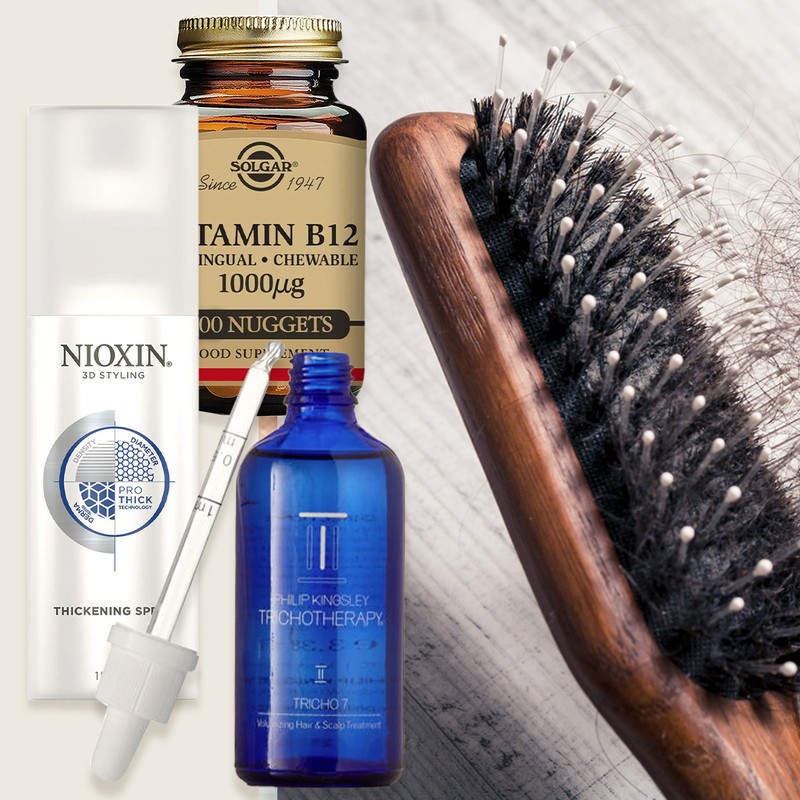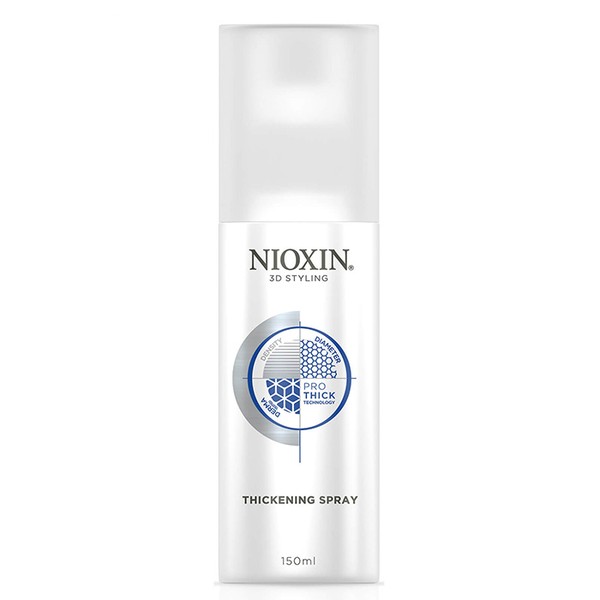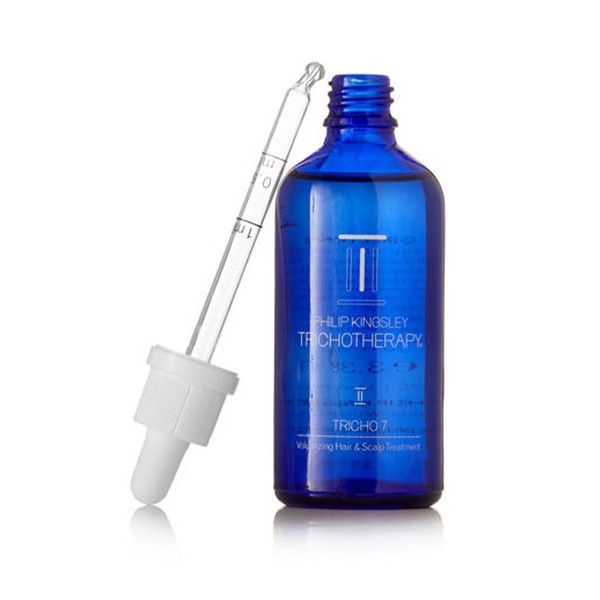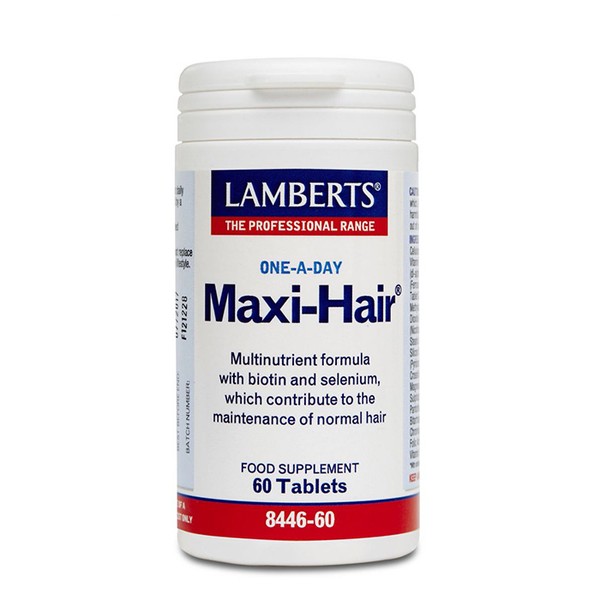
Everything You Need To Know About Hair Loss
Let’s start with the basics: why does hair loss happen as you age?
“It’s important to recognise that there is no single cause for hair loss,” explains Dr Mariam Adegoke, founder of Adegoke Wellness Clinic. “There are so many variables, from genetics to stress, as well as a number of lifestyle factors. If we’re talking solely about why it happens as we age, then this is commonly noticed around the menopause, a time where hair loss inevitably increases. The drop in hormone levels during the menopause means hair grows more slowly and, as a result, becomes thinner from there on in. You also have fewer female hormones, which triggers an increase in male hormones – androgens – which shrink hair follicles. Often, you’ll start seeing thinning mainly around your parting, but it’s worth noting that this will rarely lead to overall baldness. Another key reason for hair loss is stress. If you’ve experienced shock or any stressor to your system – from illness to operations and dietary deficiencies – you can expect shedding of your hair. It will bounce back, but it can take six to nine months for hair to return to its usual state. Finally, medical conditions, including thyroid problems, iron deficiency, psoriasis and lupus are all common causes.”
With the latter in mind, how can you tell if it’s signs of an underlying condition?
“The best way to determine what’s causing extreme hair loss is to see a specialist or doctor,” says Dr Bessam Farjo at the Farjo Hair Institute. “Through in-depth consultations and analysis, we can help determine your diagnosis, as well as rule things out. At my clinic, we have tools such as the TrichoTest that can determine whether hair loss is genetic or simply down to ageing – there is so much we can do now which is the good news. As with anything, the sooner you come in to see us, the better, as more treatment options will be on the table. This is especially the case with mature women, who may find nutritional deficiencies post-menopause are worsening hair loss. Often it’s very treatable and not a sign of anything untoward.”
In terms of treatments, should you consider anything specific during or after the menopause?
“Put simply, yes,” says Anabel Kingsley, trichologist at Philip Kingsley. “Hormones play such a major role in the growth cycle that it’s important you take a preventative approach. What I mean by this is, where possible, you can try and boost your oestrogen levels short-term. Oestrogens are ‘hair-friendly’ and they keep your strands in their growth phase for anywhere from three to seven years. Leading up to the menopause, they decline rapidly, which is why HRT is now becoming so widely recommended. Certain HRTs can actually prevent or improve hair density changes. However, others won’t have an impact and can be detrimental, so if hair loss is a concern, it’s important you speak to your doctor first and they can advise you on the best course of treatment for your individual needs. Likewise, good supplementation can be beneficial. As hair is a non-essential tissue, its nutritional requirements are high and unique. In short, this means you can’t always give your hair the nutrients it needs purely through food. Look for supplements that address your specific deficiency and needs. We formulated ‘Tricho Complex’ specifically for hair and the formula is based on tens of thousands of blood tests we’ve analysed. It tackles the most common deficiencies which cause hair loss – think a lack of iron, vitamin B12 and vitamin D.”
In terms of day-to-day, how can you boost growth and hair strength easily?
“There are a few things you can do to help minimise and improve the effects of hair loss,” adds Anabel. “As we grow older, it’s important to take a holistic, personalised and multi-pronged approach to most things, but especially hair loss. Try addressing each of the following factors: your general health, diet and nutrition, stress levels, scalp health and the condition of your hair itself. Do this by investing in scalp topical treatments. I maintain that they are the most effective – and non-invasive – way to treat thinning hair, especially as we age. They stimulate the scalp and boost growth around the follicles. Likewise, you can now get hold of anti-androgenic (anti-testosterone) drops, which are called Minoxidil. These work to boost hair growth by prolonging the anagen (growth) phase of your hair cycle. They also prevent the male hormones from affecting the follicle itself. Finally, I recommend you go easy on styling your hair. As we get older, our hair becomes drier, causing it to break and fray. Maintain hair hydration with moisturising masks, conditioners and shampoos. Try formulas that include ‘proteins’ as these will add bulk to your hair while strengthening it, too.”
Speaking of diet, what foods – if any – can help boost fuller hair?
“As mentioned above, a healthy, balanced diet is vital to good hair,” continues Anabel. “The nutrients in anything we eat are first sent to keep our essential systems and tissues functioning and only then, if there is enough left over, does our hair benefit. This means even a small deficiency can impact our hair. With this in mind, it’s important to include certain nutrients and food groups in your diet, especially as you get older. Firstly, protein is key. Our hair is made of protein and amino acids, so we need them in our diet too for stronger strands. Eat plenty of oily fish, lean meat and low-fat cottage cheese. Nuts, pulses and legumes are a great form of protein, too. Secondly, stock up on complex carbohydrates. Think brown rice, wholewheat pasta and couscous, and sweet potatoes – these are important as they release sustained energy to your body, but also to your hair. Finally, don’t neglect iron. It’s needed to produce the protein your hair is made of. You’ll find it in red meat, but also in beetroot, dried apricots and dark, leafy greens.”
Do any shampoos or conditioners actually help hair loss, or are they marketing hype?
“To be completely transparent, there isn’t a shampoo or conditioner that’s good for hair loss,” says Dr Bessam. “If your hair is going to fall out with age, or courtesy of genetics, then a shampoo won’t be able to prevent it. That said, there are two elements in shampoo that have some claims which can aid growth – however, it is important to caveat that the science behind it is a little weak. Firstly, caffeine has been scientifically proven to positively affect hair growth in lab studies. This is a different situation to someone actually using it on their scalp as temporarily as a shampoo. Theoretically, it can help, but there are no significant studies from consumer trials showing that it can boost hair growth in practice. Secondly, the type of shampoos that may help with hair growth are anti-inflammatory shampoos that contain an ingredient called Ketoconazole (Nizoral is one brand name). It certainly works very well to treat dandruff, and there is vague evidence that it has an anti-androgen effect, too. There are medicines that do manage hair loss better than topical remedies. Finasteride is available in tablet form and while licensed for use in men, it can also be used for women – it’s incredibly effective at strengthening hair and halting further loss. As mentioned above, Mionxidil is brilliant too.”
So, what about more in-depth treatments, are there any worth trying if you’re inclined?
“Microneedling can be done on the scalp to stimulate the body’s natural wound healing process and also to produce collagen,” says Dr Mariam. “This repairs tissues around hair follicles and promotes better growth. You can also try PRP (Platelet Rich Plasma) which is where a sample of your blood is taken and spun to separate it into layers. This is then reinjected into your scalp to release growth factors and stimulate follicles. Both treatments can be used individually, but we often recommend them in combination for really visible results.” Dr Bessam adds: “Another option is hair transplants. A common misconception is that they are only for men, but we perform a lot on older women and they have fantastic results. If you’re considering this, you do need to think about the long-term management of your hair. We can only move hairs from one area to another, and it’s important to remember that it doesn’t stop loss – it simply fills in gaps.”
When it comes to colouring your hair, should this be avoided, or is it irrelevant?
“This question comes up frequently among my older clients,” explains Dr Bessam. “The simple answer is hair dye can impact hair loss. Although it doesn’t inhibit growth, it can result in more shedding and cause fallout by damaging the hair, particularly if you use bleach. You may not realise it, but the rubbing and combing that’s associated with hair dye can loosen hairs that are in their shedding phase. Hair dye also contains both ammonia and hydrogen peroxide which contribute to shedding. If you think your hair loss is associated to dye, I recommend taking a break and having a recovery period where you nourish your hair with conditioning treatments to lock in moisture. However, it’s not all doom and gloom – semi-permanent colour or balayage techniques are far less damaging and can be taken more throughout the mid-lengths so you’re not putting so much pressure on your scalp.”
Any key misconceptions around mature hair loss you could demystify?
“So many, but a key one is that many women believe hair loss affects them in the same ways as it does men,” says Anabel. “This isn’t true. There are different types of hair loss and usually they occur in different patterns that are caused by different things. Men naturally have higher levels of androgens which is why the volume and reduction they experience tends to be more pronounced. Often, men find their volume reduction is at their temples and crown, whereas women are usually affected more overall with an even loss of density.” Dr Bessam agrees: “As men have higher testosterone levels, they’re more likely to produce higher DHT levels (dihydrotestosterone) which is something that binds and shrinks the hair follicles, resulting in loss. It’s why men often experience receding hairlines, whereas women tend to experience more thinning of the hair on the sides and top of the scalp.” Dr Mariam adds: “Another misconception is that if you start losing your hair it’s irreversible. This isn’t true and it’s important to know this. Once loss begins, you can slow it down and restore some of it slightly. There is so much that can be done now, so don’t lose hope.”
Finally, who should you see if you’re concerned over excess hair loss?
“Speaking with a hair restoration specialist is your best option for getting true expertise and advice,” finishes Dr Bessam. “This includes hair specialist doctors, hair restoration surgeons, dermatologists and trichologists. Always check if they’re a member of the British Association of Hair Loss Surgery to ensure you’re getting a reputable opinion. You can do this by looking them up at bahrs.co.uk. I recommend the British Hair & Nail Society too for doing your research on experts and finding the right consultant for you.”
SIMPLE TAKEAWAY NOTES FOR STRONGER, HEALTHIER HAIR:
-
Reduce the heat and chemical processes you use on your hair
-
Wash your scalp regularly to rid build-up and keep follicles clear
-
If you think you’re lacking nutrients, try supplements. Experts recommend Lambert’s Maxi Hair
-
Check out key ingredients like ‘Minoxidil’ and ‘Ketoconazole’
-
Speak to a professional or your local trichologist as soon as possible to get on top of the issue – especially if shedding is in serious excess
Shop The Expert’s Top Strengthening & Growth Remedies




DISCLAIMER: We endeavour to always credit the correct original source of every image we use. If you think a credit may be incorrect, please contact us at info@sheerluxe.com.

